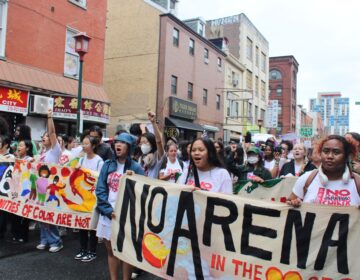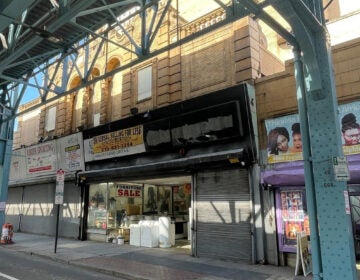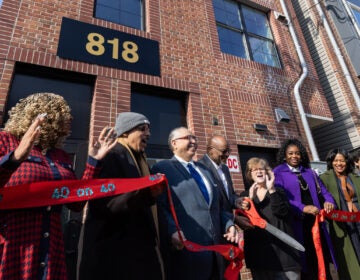Tensions flare as legislative process for Sixers’ arena proposal gets underway
Councilmember Mark Squilla introduced a package of bills that would authorize the arena. Lawmakers will now spend weeks considering them.
-
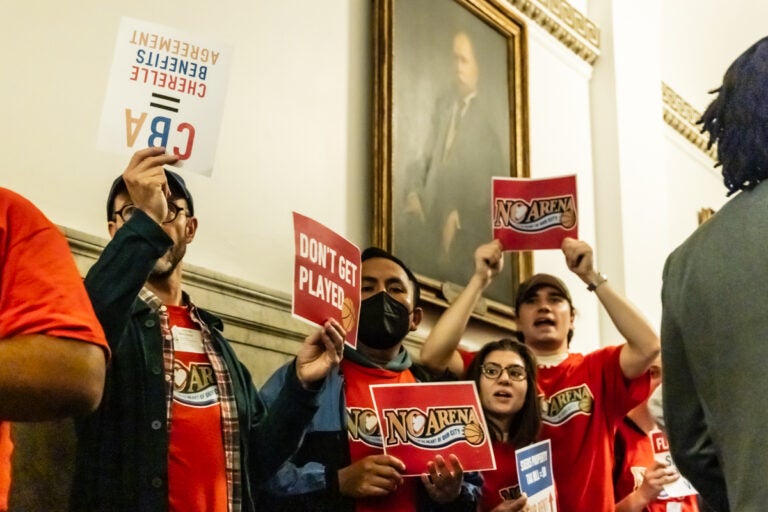
Members of the No Arena in the Heart of Our City Coalition packed the halls to Philadelphia City Council chambers in protest Oct. 24, 2024. (Kimberly Paynter/WHYY)
-
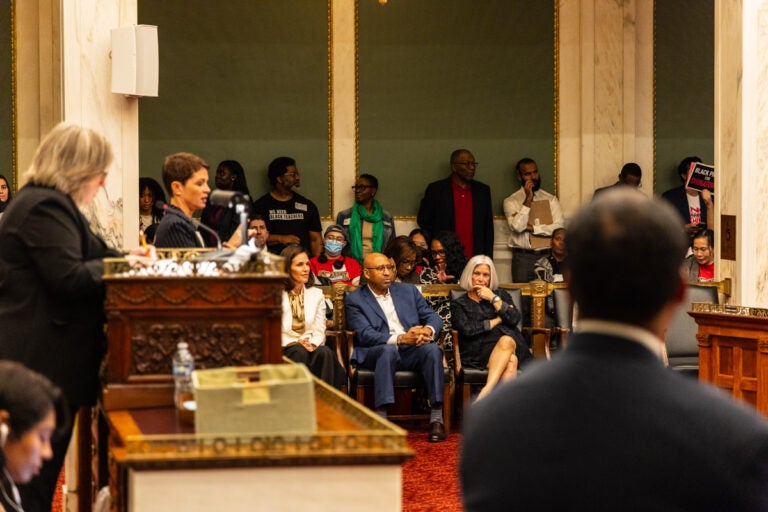
Former Philadelphia Mayor Michael Nutter attends the City Council session Oct. 24, 2024. (Kimberly Paynter/WHYY
-
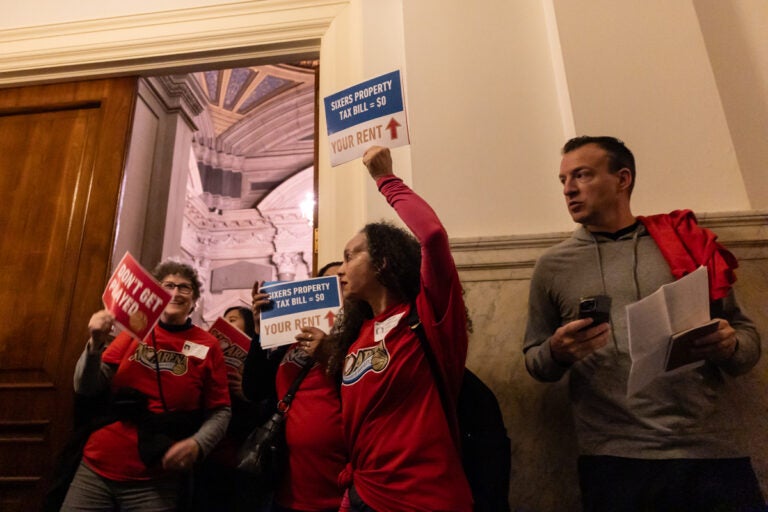
Members of the No Arena in the Heart of Our City Coalition packed the halls to Philadelphia City Council chambers in protest Oct. 24, 2024. (Kimberly Paynter/WHYY)
-
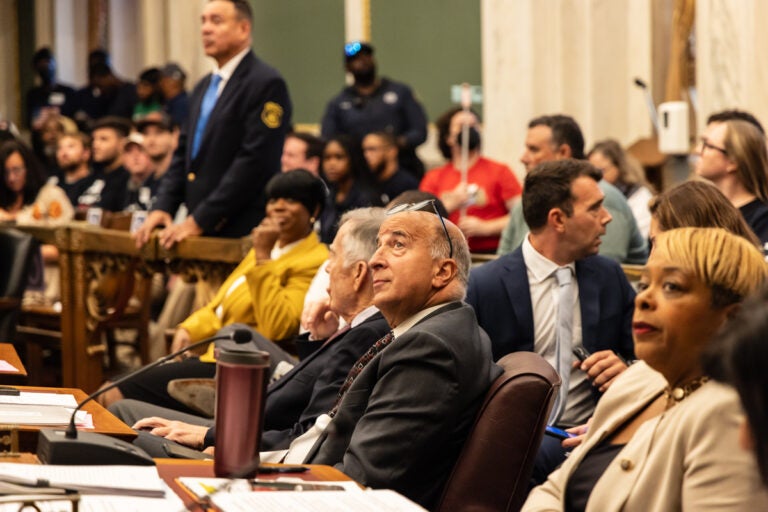
City Councilmember Mark Squilla watches arena protesters leave Philadelphia Council chambers after the Sixers arena legislation was introduced Oct. 24, 2024. (Kimberly Paynter/WHYY)
-
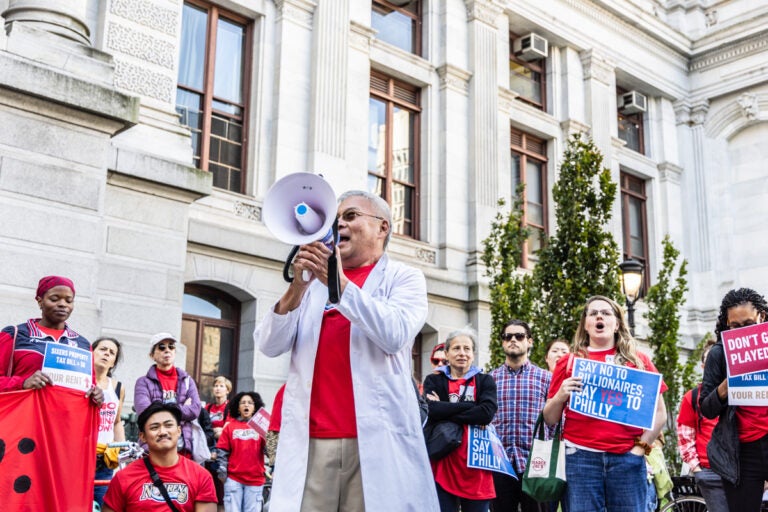
Dr. Walter Tsou speaks against the Sixers arena being so close to the Jefferson trauma center in Philadelphia at a protest outside City Hall Oct. 24, 2024. (Kimberly Paynter/WHYY)
-
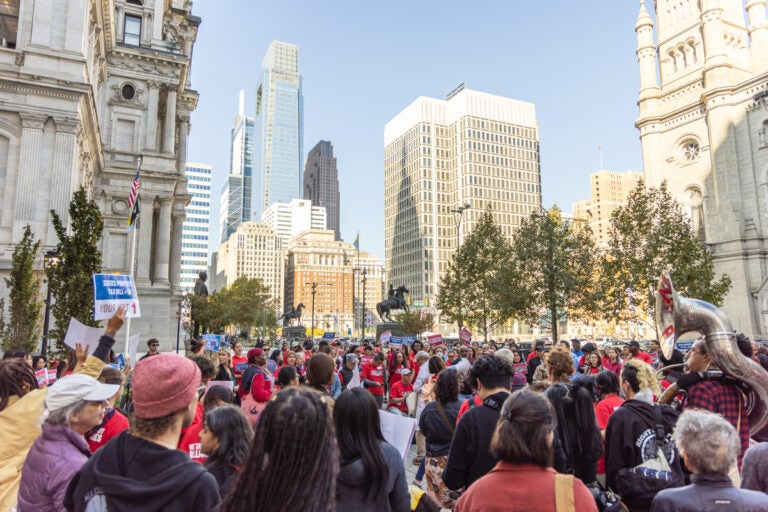
Members of the No Arena in the Heart of Our City Coalition protest outside City Hall as arena legislation was introduced into Philadelphia City Council Oct. 24, 2024. (Kimberly Paynter/WHYY)
-
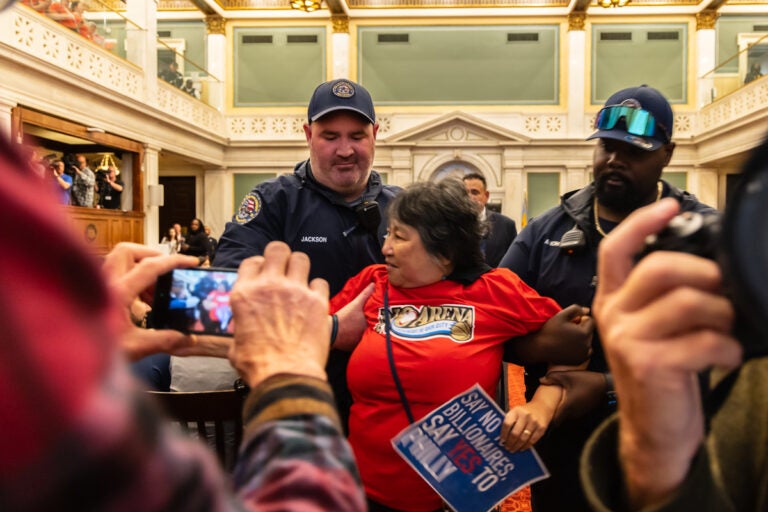
No Arena Chinatown organizer Debbie Wei was removed from Council chambers in Philadelphia Oct. 24, 2024. (Kimberly Paynter/WHYY)
-
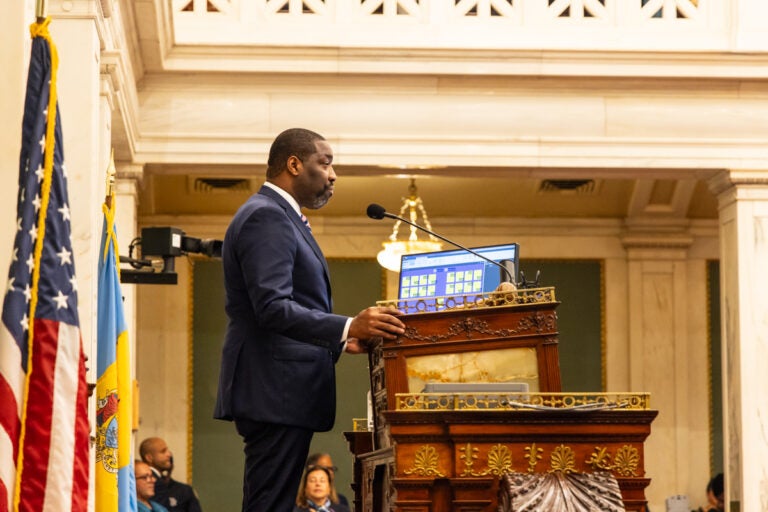
Philadelphia Council president Kenyatta Johnson introduces arena legislation into Council Oct. 24, 2024. (Kimberly Paynter/WHYY)
-
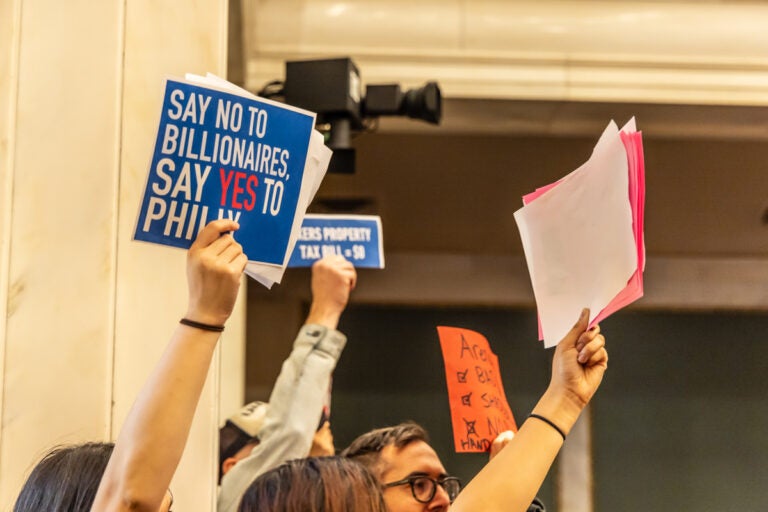
Protesters disrupt Philadelphia City Council as Sixers arena legislation was introduced Oct. 24, 2024. (Kimberly Paynter/WHYY)
-
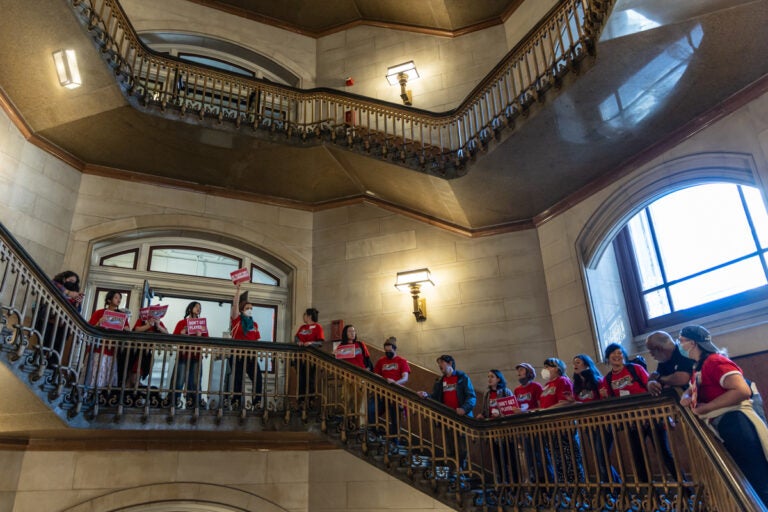
Members of the No Arena in the Heart of Our City Coalition pack the halls to Philadelphia City Council chambers in protest on October 24, 2024. (Kimberly Paynter/WHYY)
What you need to know
- The 76ers have proposed moving to a new $1.55 billion arena near Chinatown called “76 Place”
- The proposal has drawn swift condemnation, excitement, skepticism — and plenty of buzz
- Black Clergy of Philadelphia has endorsed the project, while a majority of Chinatown businesses and other community members have voiced their opposition
- Philly Mayor Cherelle Parker formally announced her support for the arena and unveiled a community benefits agreement
Have a question about Philly’s neighborhoods or the systems that shape them? PlanPhilly reporters want to hear from you! Ask us a question or send us a story idea you think we should cover.
The 76ers’ controversial arena proposal dominated Thursday’s City Council meeting.
As promised, Philadelphia Mayor Cherelle Parker transmitted a legislative package containing the approvals the Sixers need to build the $1.55 billion development in Center City.
Soon afterwards, Councilmember Mark Squilla introduced the bills, the first step in what’s expected to be a contentious legislative process filled with fiery testimony from people for and against the massive project.
A preview of that tension came before the bills were even read into the record.
Loud boos and chants erupted from at least 100 arena opponents, who say the project poses an “existential threat” to Chinatown and would negatively impact nearby neighborhoods like Washington Square West and the Gayborhood.
“No arena. No arena,” the group yelled repeatedly from a pair of balconies above the chamber floor.
As people clapped and stomped their feet, others unfurled large red banners condemning the project.
A look inside Philly's City Council session, where advocates are protesting the proposed Sixers arena.
— WHYY News (@WHYYNews) October 24, 2024
More on the arena → https://t.co/eYLWpPRR9P pic.twitter.com/TcZF1Zw7TI
Longtime activist Debbie Wei was dragged out of chambers by law enforcement. “No arena. Save Chinatown,” the 67-year-old shouted as she was pulled towards the door by two men.
Boosters of the development shot back with a chant of their own.
“Build it. Build it,” they screamed as Council President Kenyatta Johnson attempted to silence the commotion with his gavel.
The protesters were eventually cleared from the chamber after several minutes. And the session proceeded without more disruptions.
What’s in the package?
The legislative package from Mayor Cherelle Parker’s administration included 11 ordinances and two resolutions.
Part of the package contains zoning and planning approvals. Other measures are related to an existing neighborhood improvement district and financing arrangements tied to the Fashion District mall.
Squilla, whose district includes the proposed site at 10th and Market streets, also introduced two arena-related bills of his own.
One bill would create a special services district around the arena, a measure designed to give nearby residents some agency when it comes to the conduct of the arena. The other would create a new zoning overlay for Chinatown, in part to preserve the scale of the neighborhood.
“I introduced it because I believe there are enough safeguards in place that I could possibly vote for it. I would like to get some more safeguards and do some additional things working with those communities,” said Squilla after Thursday’s meeting.
The Sixers have said they need legislative approval from Council before the end of the year to keep the project on track. The team wants to start vertical construction in 2028 and open the arena in 2031, the year its lease ends at the Wells Fargo Center in South Philadelphia.
The legislative package will be the subject of at least two public hearings next month.
The bills must be passed out of committee and by the full council before it heads to Parker’s desk for a signature.
The final session of Council is scheduled for Dec. 12.
Parker announced her support for the arena last month in a pre-recorded video posted to social media. The mayor said her administration had reached a “historic agreement” with the Sixers, calling it “the best financial deal ever entered into by a Philadelphia mayor for a local sports arena.”
Parker argues the development will generate millions in tax revenue, create hundreds of jobs and help revitalize Market East. The Sixers have echoed those claims since announcing the proposal more than two years ago.
The head of the Building Industry Association of Philadelphia is on board, too.
“We gotta stop being a city that’s against big things,” said BIA President Mohamed “Mo” Rushdy before the meeting. “This is economic activity, this is reviving a dead corridor. This is long overdue.”
For now, it’s unclear if the development has the votes to move forward. Council members were not ready to take a firm position on the arena Thursday, choosing instead to focus on the legislative process in front of them.
“It’s gonna be a robust dialogue to make sure that the end product is one that represents what the city of Philadelphia looks like demographically and, most importantly, addressing the district councilperson’s issues and concerns,” Johnson said.
“It’s gonna be a really riveting discussion. It’s gonna be difficult. But I want you to know that we all will get through this as a unit. We will all do this in some ways together,” said Councilmember Anthony Phillips. “I look forward to seeing how we work this out to make our city better.”
‘It’s up to us’
Before the meeting got underway, hundreds of protesters gathered outside City Hall in opposition to the arena.
A group, part of the newly formed “No Arena in the Heart of Our City” coalition, gathered outside Council chambers as lawmakers prepared to set the session’s agenda.
“Don’t let them make you think that if they don’t build an arena in Chinatown, it’s the end of the world. It will be the end of the world for some people if they do. So now it’s up to us. And every day moving forward, it’s up to us. What are we going to tell all the legislators? You have to represent us. You have to have our best interests,” said Shawmar Pitts, co-director of Philly Thrive, outside City Hall.
On Wednesday, critics sent a letter to City Council condemning the community benefits agreement Parker negotiated on behalf of residents.
The letter, signed by 102 organizations and businesses, calls on Council to “delay the legislative timeline” until “community voices are adequately included and our concerns are appropriately addressed.”
“The proposed CBA never included the concerns of residents, businesses and civic organizations whose lives and livelihoods will be directly and immediately impacted for decades. Our exclusion from this process is unacceptable,” reads part of the letter.
If the arena is approved, $25 million will be used to support impacted communities, including Chinatown, the closest neighborhood to the proposed site. Another $25 million will fund citywide initiatives. Opponents say that split is unacceptable given the threat they say the arena poses to Chinatown’s future.
The CBA is part of the broader agreement the Parker administration negotiated with the Sixers.
Under the deal, the team will also send roughly $6 million a year to the city in the form of PILOTS, or payments in lieu of taxes.
The agreement stipulates that the team will lease the land for the arena from the city after contributing the parcels for a “nominal value.” The arrangement means the franchise will not pay real estate taxes, paying PILOTs instead.
Critics say the deal equates to a city subsidy because those payments will likely be less than the taxes the team would pay if it owned the land.
The deal also includes a “favored nation” clause, which would effectively enable the Sixers to receive taxpayer dollars in the future if the city subsidizes a different sports facility in Philadelphia after the arena is approved.

Subscribe to PlanPhilly
WHYY is your source for fact-based, in-depth journalism and information. As a nonprofit organization, we rely on financial support from readers like you. Please give today.





